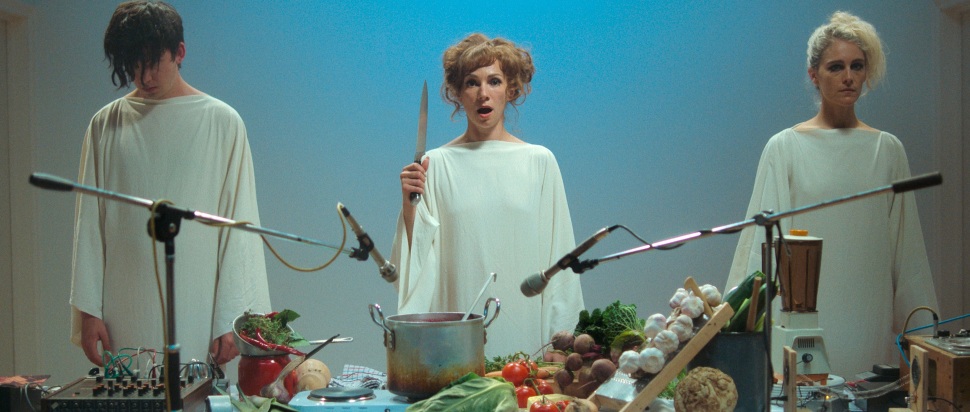Cooking With Gas: Peter Strickland on Flux Gourmet
Avant-garde sonic caterers? Nipple-twisting kinks? The melancholy of flatulence? You'll find all and more in Flux Gourmet from Peter Strickland, one of the most visionary voices in British cinema
While watching Flux Gourmet, the latest film from Peter Strickland, British cinema's premier chronicler of kink, fetish and general weirdness, I’ve a feeling of déjà vu. The film features an avant-garde musical trio who create freaky soundscapes and performance-art pieces using foodstuff. The chopping of vegetables, the whirl of food processors or the sizzle from a frying pan are their notes and chords. I think to myself, “I’ve seen an outfit like this before”. It’s only as the credits roll that it hits me. It was Peter Strickland’s own band! Aptly called The Sonic Catering Band, I saw them perform in 2015 as part of Manchester International Festival.
“Oh, that was one of our worst gigs,” Strickland says with a grimace when I bring up that MIF performance. “It was terrible, terrible, terrible. After that, we just said 'never again', we just kind of stopped.”
The Sonic Catering Band may be no more, but their legacy lives on in Flux Gourmet. Initially, Strickland's concept of making a film inspired by their obscure project was an inside joke. “I liked the idea because it's perverse to make a film about a band that nobody's heard of. Usually, that status is reserved for, you know, Queen or someone on that kind of level. We did a gig once and only one person turned up.”
The film may have begun as a gimmick but that quickly wore off as interesting threads crept in. "Some people might consider the approach unusual, but to me, it's no different from, say, Joanna Hogg looking back on her life with The Souvenir films,” says Strickland. “OK, the result is different. With our film, you don't quite know what's fiction and what’s real, whereas I gather Hogg’s films are much more straightforwardly autobiographical. But we’re also looking back at a mass of creativity; we’re looking back at egos and the creative process.”
Another key thread is the struggle between financiers and artists. The trio – who can’t even decide on a name – take up a “culinary and alimentary performance” residency at an art institution based in a country manor. The institute’s director (played by a wild-eyed Gwendoline Christie) insists on providing notes on each performance, much to the annoyance of the band’s frontwoman, Elle (Strickland regular Fatma Mohamed). It’s a dynamic that Strickland knows well. “Oh, it’s very relevant to filmmaking. Much more relevant to filmmaking than it is to music. I mean, [The Sonic Catering Band] never had anyone telling us what to do.”
Can we assume Elle is Strickland’s surrogate in the film, then? “Oh, I see myself in all the characters,” says Strickland. What? Even Dr Glock, the institute’s gleefully sadistic medic. “Oh definitely,” he says without missing a beat. “A filmmaker’s job is to be a devious bastard, and that's Dr Glock.”
The centre of the film is not the band, the financier or the malevolent MD, however. Our gateway into this strange world is Stones, played by the perennially downcast Greek actor Makis Papadimitriou. Stones is a self-confessed “hack writer” whose job at the institute is to interview the band and keep a record of their process. Strickland clearly has a soft spot for his sadsack protagonist. “Stones is a hack but I’m a hack too,” he says. “Most of my work in between films is for other people. I write for hire. I am given a concept or a book or script and I am in. I do what people want. Which I'm fine with. Hack is a dirty word in the creative industries and I wanted to have a more sympathetic view of being a hack. Only rich people use hack as a pejorative.”
Stones' job is to blend into the background and simply document; he’s not the most obvious of focal points. “I always find people who tried to be invisible really fascinating, and I like the idea of this unassuming character unwittingly getting pushed to the forefront of the whole film.” Another reason why Stones is struggling to blend in is that he’s suffering from a severe case of flatulence, the pain, discomfort and embarrassment of which he tells us about in great detail in voiceover. When Elle gets wind (sorry!) of Stones' incredibly private issues, she hijacks it for the performance and incorporates Stones into her art.
While Flux Gourmet is often laugh-out-loud hilarious, Stones' flatus is never the butt (sorry! again) of the joke. Instead, the melancholic sincerity with which Strickland approaches his condition recalls Robert Bresson's Diary of a Country Priest and Paul Schrader's First Reformed, two other great films about protagonists with tummy troubles. “What was interesting for me was to take something you traditionally find funny, both in real life and in films, flatulence, and to see if it's possible to give it a different tone – give it a solemn tone, even,” says Strickland. “It's one hell of a risk. What if the audience just laughs at this character? But it was something I wanted to try and I just felt it probably hadn't been done before.”
Flux Gourmet is in cinemas and streaming from 30 Sep via Curzon
For more on Flux Gourmet, check out the EIFF episode of The Cineskinny podcast – listen here (from 43:50 onwards), via Spotify
